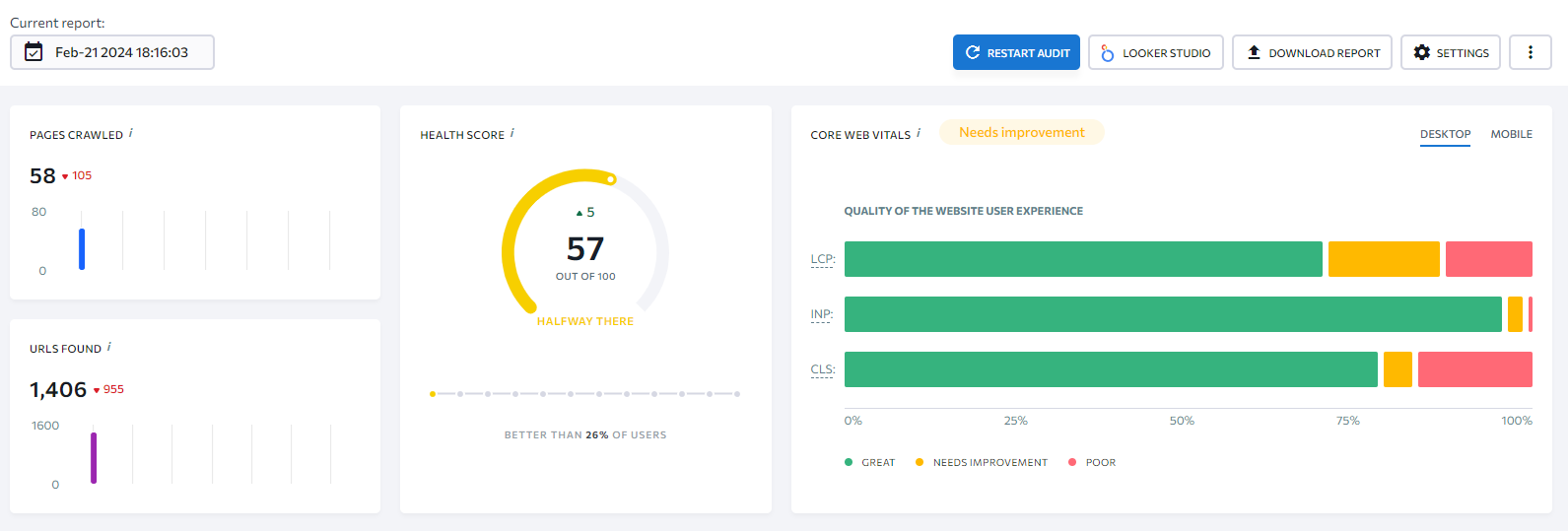Speed is everything!
Web page load time is a critical component that determines online success or failure. Desktop sites have between 4 and 9 seconds to grab interest before the customer moves on to another site. Advancing technologies have shortened the attention spans of consumers. 53% of mobile websites have less than three seconds to capture the eye of a customer. If these numbers are not startling enough, every second in the delay of a page load yields 11% fewer visitors.
Website speed testing tools are essential methods for discovering and monitoring page loads of a website. Here are 13 of the best tools for testing website speed.
1. SE Ranking
This comprehensive SEO platform has its website speed analysis tool. You can see it in the Website Audit section, which has a dedicated Core Web Vitals category.
The advantage of SE Ranking is that it is not just a page speed checker. After receiving data about the problems, you can granularize the report and see the specific pages that require your attention. The service will provide you with both the best website speed test and tools to improve the current situation:
- Detection of unoptimized JavaScript and CSS code in the Issue Report section;
- Evaluation of the Text-to-HTML ratio, which shows the efficiency of the code;
- Search for unoptimized multimedia in the Found Resources section;
- Evaluation of hosting capabilities;
- Detection of problems with the CMS, individual plugins, and other elements of the program base;
- Search for redirects that slow down page loading.
Website load speed test is included in the list of regular checks that can be run manually or automatically. If the system detects a significant deterioration in performance, it will send you an email warning. By taking the necessary measures in time, you minimize the impact of such problems on the effectiveness of SEO.
The Website Audit module is available as part of a basic SE Ranking subscription starting at $44 per month.
2. Google PageSpeed Insights
Google PageSpeed Insights; no website speed test list is comprehensive without the 800 LB. Gorilla.
The outstanding facets of this free toolset are the mounds of support materials once you enter a URL.
- Google Webmaster Central
- Apache and NGINX server modules
- Google Public DNS
- Best practices, protocols, and standards
PageSpeed encompasses mobile performance along with a host of desktop site improvements.
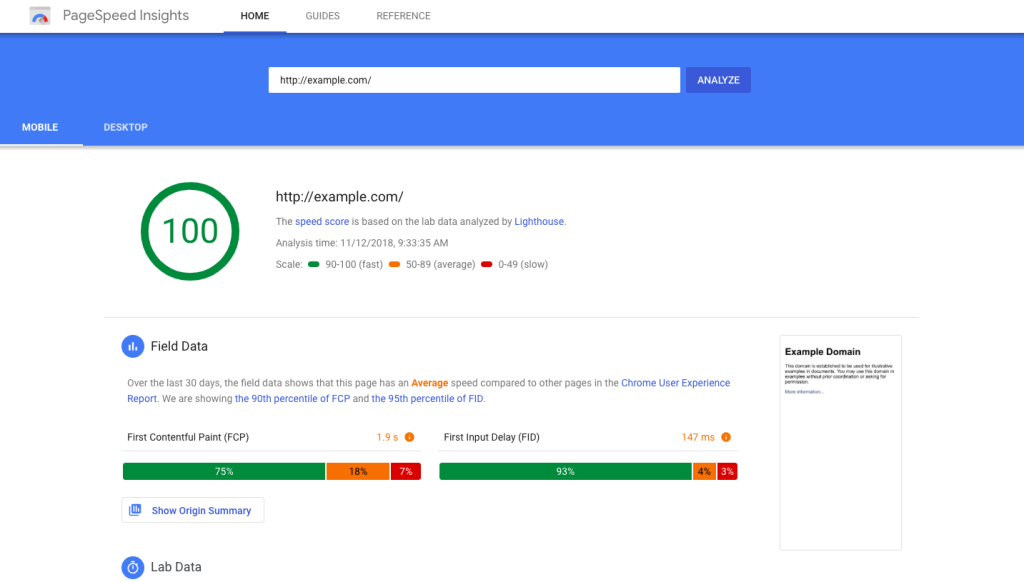
Enter a URL and Google returns a performance score summarizing several aspects of a page load. They base the rating on Google’s real-world performance algorithms and historical search patterns. Webmasters can improve performance with core values, selected metrics, and additional diagnostic data Google provides.
PageSpeed uses the open-source platform, Lighthouse, and its vast array of resources.
Use the platform for automating the ongoing quality of a website. Webmasters can run Lighthouse in Google’s developer toolset or from the command line.
3. GTMetrix
GTmetrix has developed into a technologically advanced powerhouse with website speed testing tools and comprehensive resources.
The feature set for GTmetrix is substantial, and its learning curve is formidable. However, once you have digested the platform, a webmaster has a solid foundation for the future. There is a free version and several pro options for easing into the platform.

Analyze a site’s page load performance in real-time from any of the 38 data centers around the world—track performance on the comprehensive dashboard for later brainstorming. Analyze every detail of a page load on different screen sizes and resolutions.
Record page loads with advanced video to pinpoint exact bottlenecks. Use the alert system to find DNS and COM issues in real-time. Support materials for GTmetrix are excellent, with WordPress and Getting Started Guides.
The cost of an individual subscription to GTmetrix starts at $4.25 per month. Subscription plans for small and medium-sized businesses start at $72.5 per month and for large businesses — from $510.
4. Pingdom Tools
Pingdom started its journey to success as an app that pinged sites to verify existence on the newly formed internet.
Pingdom has grown into a multi-faceted performance page speed test platform with a variety of tools.
- Page speed test and load performance
- Ecommerce transaction monitoring
- Uptime and performance alerts
- APIs
Pricing for the service is affordable, with a Free Trial offered. Enterprise webmasters will need to contact the service for pricing. The background of Pingdom has provided several intuitive tools like the speed test. Discover page loads from several data centers around the world.
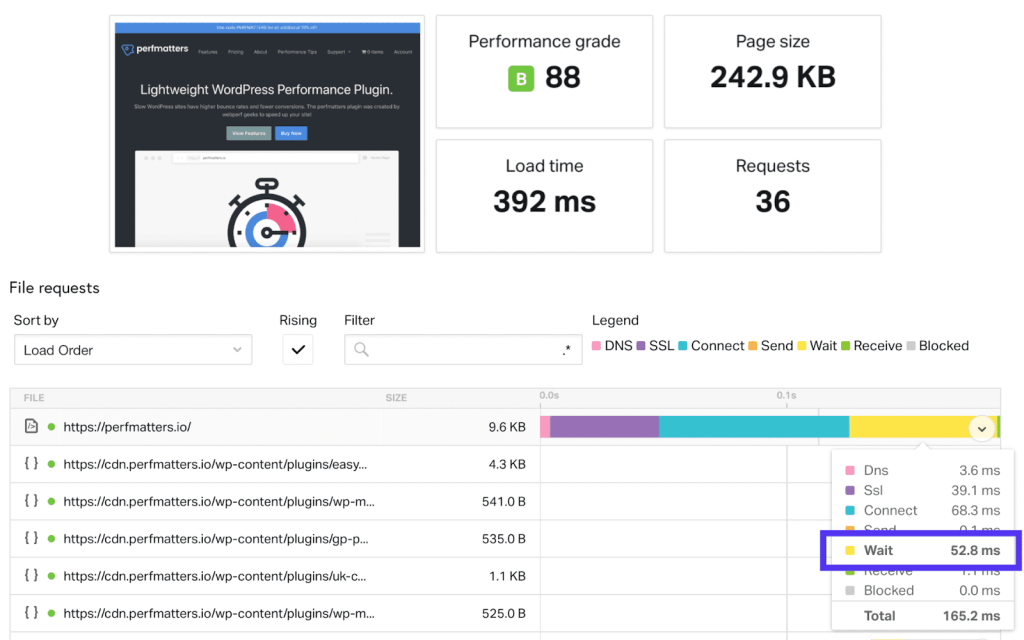
Pingdom’s website monitoring is a strong point. Easy to read and understand server response codes, content types, and different states of page load are all monitoring points or alerts.
Using speed tools to improve the performance of a website does not happen overnight. The process takes a bit of time to understand where the bottlenecks are and how to ease the problem. If a page loads less than three seconds, it will be faster than 50% of all websites.
When you subscribe to Pingdom, you will pay separately for synthetic tests and real statistics gathering. Both modules cost $10 per month.
5. WebPage Test
WebPage Test is an excellent platform to test and monitor site performance. The number of options, such as test location is enormous.
First impressions of WebPage Test make it look like a simple tool. However, knowing how a site loads from dozens of points around the world and in different browsers is invaluable.
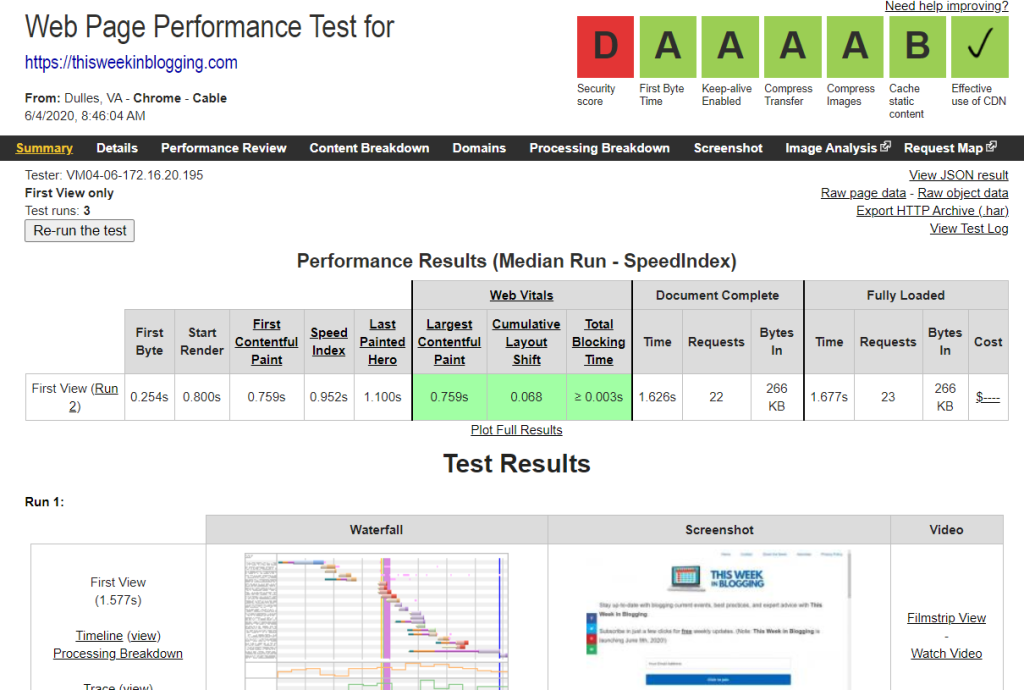
The service provides tools not available from other testing sites.
- Repeat view (loads the site, closes it, then reloads and monitors the results)
- Traceroute starts with the IP or host name from locations around the globe
- Visual comparison lets webmasters find loads on different mobile connections.
WebPage Test provides information quickly and accurately. A subscription to the full range of tools will cost $15 per month. But if you limit yourself to 300 checks per month, you don’t have to pay for it.
6. Dotcom Tools
Dotcom-tools by Dotcom-Monitor are a suite of tools with a solid analytical foundation.
The company offers an impressive range of speed tools and monitoring solutions. Dotcom-tools start with a full battery of free testing procedures. Each free test comes with impressive documentation and a lot of options.
The Pro-Solution for dotcom-tools lets the webmaster test and monitor any number of websites with an easy to understand dashboard. Everything from load and stress testing to infrastructure monitoring is available.

Dotcom-tools pro monitoring and testing are some of the most powerful platforms available to the webmaster. Deep website integration is possible through private agents and filters. Use the schedules and alerts function to set up any type of system monitoring.
You can use Dotcom services for free if you need 300 monthly checks from 5 sources. To increase these figures to 1,000 checks and an unlimited number of locations, you will have to pay $9.99 per month. For 5,000 checks, $29.99 will be charged.
7. Uptrends
Uptrends is a speed testing site that provides a variety of free tools and varied paid options. Webmasters can use the Free Trial to check their websites and the service, to see beforehand, if there is a match.
Uptrends offers a fairly simple pricing scheme. If you need a couple hundred checks a month, you can get by with the free version. For a Business subscription with advanced monitoring tools, you’ll have to pay $100 per month. Large companies can use the Enterprise plan, the terms of which are discussed individually.
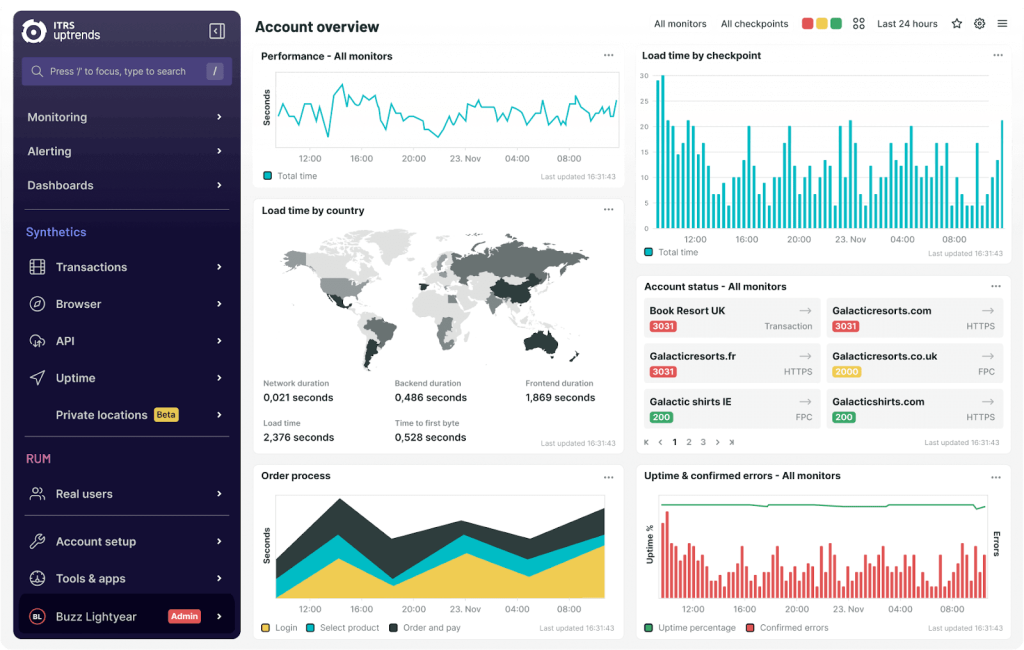
Each plan offers a robust free trial and also add-ons to the service. Webmasters can add a Real-User monitoring feature based on website visits.
Uptrends has packaged an impressive line-up of tools and monitoring solutions for any number of websites or services.
8. ContentSquare Speed Analysis (former Dareboost)
At first glance, it may seem that ContentSquare Speed Analysis exactly replicates the functionality of Google’s standard page speed testing tool. It also focuses on the Core Web Vitals metrics and displays the test results in a simple, intuitive graph.

However, just one click on the indicator you need makes a big difference. ContentSquare Speed Analysis provides as much detail as possible, allowing you to find problems in the rendering of a particular image or the poor optimization of a certain code fragment. Moreover, the service provides information on common ways to solve such problems and links to its own knowledge base. This makes it one of the best Gtmetrix alternatives for true professionals in the field of SEO, website administration, or content management.
But ContentSquare Speed Analysis is not just a tool for speeding up website loading. It also highlights issues related to content accessibility and cybersecurity. You get a comprehensive, in-depth audit rather than a quick, superficial diagnosis. Moreover, its results are sorted by the impact on website optimization and the timeframe for resolution.
Unlike its predecessor Dareboost, ContentSquare Speed Analysis allows you to automate the audit of many web pages and make it regular. However, the logical step on the part of the owners was to introduce a paid subscription to this tool — its terms are discussed with company representatives individually.
9. Sucuri Load Time Tester
Sucuri LoadTimeTester is a unique site for testing page load times, then comparing to other sites that have used the platform.
Enter a URL and hit the Test Load-Time button, and Sucuri returns a full accounting of page loads from around the globe. Sucuri gives the webmaster; first connection time, first byte, and then total load time.

Sucuri gives the user an impressive graph showing specific bottlenecks. Another prominent feature is the comparison tables.
- Recent sites using the platform
- Best load times
- Worst load times
Follow links to other impressive paid offerings from Sucuri.
- Website Firewall
- Website Security
- Malware detection and removal
- Blacklist
Sucuri can be a comprehensive solution for the webmaster. The cost of a subscription to the platform depends on the required functionality. It can be from $199 to $499 per year.
10. SpeedCurve
The page speed checker is quite interesting, as it starts the account creation process with a survey. After answering a few simple questions, you will customize your ideal dashboard. The service allows you to display key metrics related to Core Web Vitals, content loading speed, and website markup.
One of the unusual features of SpeedCurve is the ability to compare results with a competitor. If you currently have mediocre results, but the loading speed of other sites in your industry is even lower, then speeding up your website will obviously not be your priority. This is a handy feature of website speed analysis that will be especially useful for experienced developers and SEO specialists.
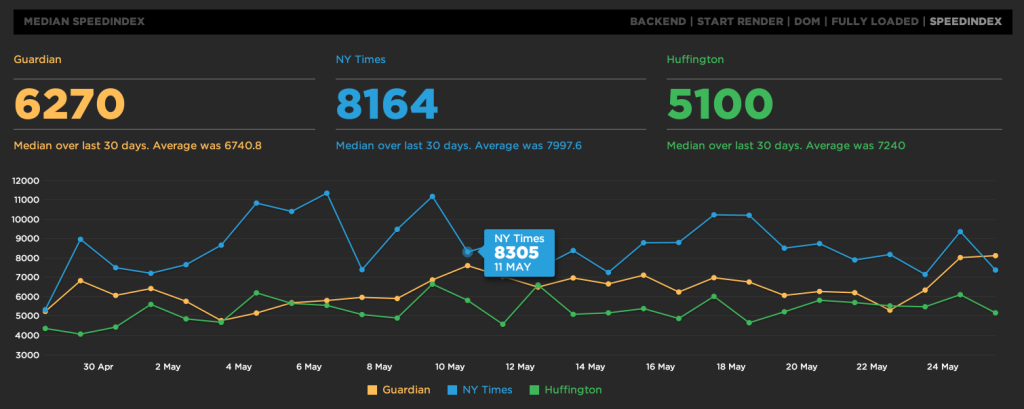
Like other participants in our review, SpeedCurve offers a wide range of reports. There is one caveat here — they don’t offer additional detail. To get data on specific problems, you need to go to the dashboard level and read the information below it. This is not very logical, so new users will have to get used to such interface features.
SpeedCurve subscriptions start at $12 per month. If you want to get real statistics on website loading speed for your visitors, you will have to pay at least $576 per month. Full automation of checks and reporting, as well as access to personal support agents, is estimated at $1,680 per month.
11. Site 24×7
Site24x7 is a complete solution for the end-user, along with a host of developer tools for site reliability. The site offers website speed monitoring on everything from specific website features to cloud servers.
A unique feature of Site24x7 is their Synthetic Transaction Monitoring. The service is a way for webmasters to replicate and baseline web applications in a production environment. Deep dive into user flows and rendition measurement.
On the developer side, administrators are given a full suite of tools to improve website performance.

A small sampling of Site24x7s offerings:
- Port availability and subnet calculator
- Real-time blacklist check
- AWS development
- CSS and Javascript beautifier
- JSON path evaluator
- JSON to PHP
The tools above are just a few of the packages designed for complete website and enterprise management by the developer.
Modern websites have become technological marvels, with no sign of slowing down. Languages of the internet, such as HTML and PHP, have grown in complexity. Webmasters must stay focused on what is critical to success, fast loading times, and content.
As the internet becomes more sophisticated and robust, monitoring and speed tools have become indispensable for webmasters. If you choose Site24x7, you can get access to them for $35 per month.
12. SEO Site Checkup
SEO Site Checkup is one of a fresh wave of website speed improvement tools. Rather than the webmaster searching endless lines of code, enter the URL, and the tool does all the work.
The site returns a score based on several SEO best practices. In addition to the score, they give explanations on a wide-ranging set of issues.
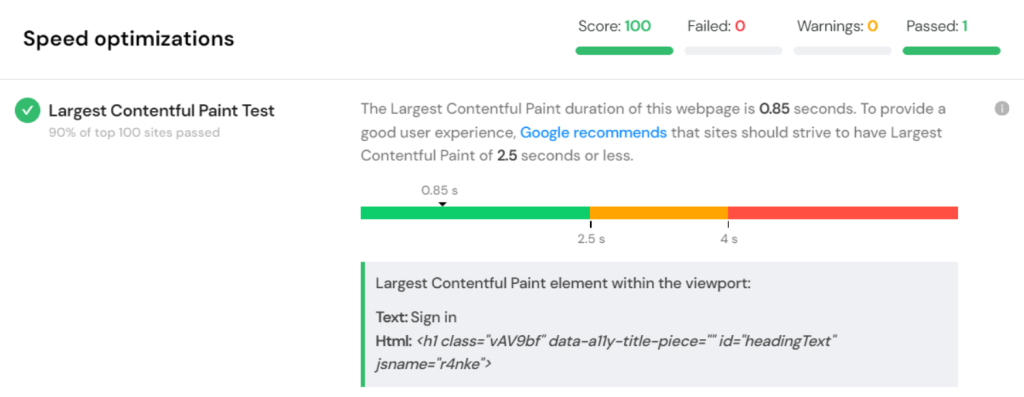
- Meta title and description tests
- Google search results
- Keywords
- Robots.txt and sitemap tests
SEO Site Checkup is one of the better sites for improving search results, because of specific actions needed by the webmaster. Each item gives specific “How to fix” results.
The service offers three pricing models from Basic to Professional, based on the number of sites, keywords, and so on. The cost of subscribing to SEO Site Checkup ranges from $29.95 to $89.95 per month.
13. YSlow
YSlow is considered by many online experts to be one of or the finest speed tools available. The software is a downloadable product, or it can be accessed from the Google Web Store as an extension.
YSlow runs on several major browser products and gives the webmaster a score computed by Yahoo algorithms. The software crawls the DOM (Document Object Model), finding issues in scripts, images, and stylesheets.

At present, YSlow has thirty-four rules each page is graded on, with each control computed differently. The open-source software gives webmasters a suggestion for each issue generated. YSlow then offers ways to improve performance and specifically page load.
YSlow gives webmasters resources to improve load times, such as SmushIt and JSLint. Read the FAQ section and see how YSlow operates and see if the platform is right for your website.
YSlow remains a free and open source tool. You can use it at your discretion, including embedding it in your software systems.
Conclusion
If you are a webmaster, developer, or IT manager, peruse the tools above to find one that piques your interest. Most of the platforms offer free trials or free versions before you need to commit.
The website speed testing tools above are 11 of the best tools on the market for testing website load times.


